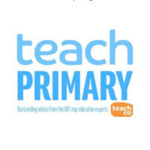Meet the School Putting Pupils First while also Taking Care of Staff Wellbeing

My staff are my most valuable resource, says Chipping Hill headteacher Ceri Jones…

- by Teach Primary
- Leading professional development magazine for KS1 and KS2 educators


Four years ago, the headship of Chipping Hill Primary School, in Witham, Essex, was up for grabs and Ceri Jones was faced with a dilemma. Leading a school in neighbouring Chelmsford, he was contacted by the outgoing head of Chipping Hill and urged to apply.
He knew the place well – very well, in fact; not only did he live round the corner, but his children attended the school and his wife even worked there as a teacher.
“I thought, do I really want this?” he admits. However, focusing on the opportunity rather than the baggage, he decided to take the plunge. “I thought, I’ll go for it and if someone gets it and they’re better than me, fine. But if they don’t and I’m the one, no one’s going to work harder.”
But even then there were doubts. “It was the last minute,” he explains. “The application window shut at 5pm on Sunday and I think it was 4.55pm. I was deliberating, but I pressed the button and sent the application, got shortlisted and here I am.”
Jones took over a successful school that had evolved and grown over recent years. He explains:
“Around nine years ago the school was a one-form entry infants on the other side of town and because of a new estate they needed a school over here.
“The local authority realised the one-form entry wasn’t required there, and there was enough capacity in the schools locally to take up any surplus, so they moved the headteacher, three teaching staff, the support staff and the office team to this building.
“And then about four years later it expanded and went to two-form entry. I took over at the school just as it was going into its first year as a two-form entry school.”
Name: Chipping Hill Primary School
Head of school: Ceri Jones
Location: Witham, Essex
Ofsted rating: Outstanding
Size: 330 pupils
1 | Challenges
Although Chipping Hill was officially classified as ‘outstanding’ by Ofsted, Jones got to grips with the data and soon realised that not everything in the garden was rosy.
“I saw that the curriculum needed bringing into line,” he recalls. “It was a little bit behind the curve.”
Maths was a particular area of concern. “This was before the changes to the assessment framework and in old money, the progress was below two levels, so it would have been a negative value. That really worried me because it had been on the development plan and was something that needed to be addressed.”
The new head also saw that some of the progress measures across the key stages were distinctly lacking. “It had been an infant school and hadn’t known what Y6 looked like. The first year the school had a Y6 was the year prior to my arrival and the progress was just below national, and for maths significantly below.”
Jones admits he was worried. “I’d taken over a school with ‘outstanding’ status and was looking at the progress and thinking, ‘Oh no! What have I done?’”
But the prospect of regret was banished and it was time to get to work.
The first thing Jones set about doing was to redesign the curriculum and the assessment process. “I do a lot of research,” says Jones. “I’m a firm believer that I should understand how children’s brains work, how they learn best.” The head also makes an effort to instil the same curiosity in his staff through professional development, although he uses a different phrase. “I actually call it ‘opportunities’ rather than professional development. I say, ‘Oh, you’ve got an opportunity coming,’ and they all have a groan and a laugh, but they know it’s going to be better for them.”
2 | Progress
Whatever steps Jones took, they certainly seem to have worked. He explains: “Now, looking at our progress, our maths was below national. Last year we were in the top one percent for progress. In fact, I think we’ve been in the top one percent for performance in the last two or three years.”
And that’s not all. “Our KS1 results this year for reading, writing and maths are all in the nineties and our greater depth is in the forties, which is twice the national average, because of the methodology we’re deploying.”
So what’s the secret? There is no secret, Jones insists.
“There are a lot of systems in education and people are always looking for the silver bullet solution,” he explains. “We’re now a national support school so sometimes people come around and they want to see how we get such good results. So they say, ‘What do you do for reading?’ But it’s not one specific thing. They expect me to pull out a document and say, ‘This is what we do.’ But it’s a lot of small things. It’s like the butterfly effect.”
Jones often draws parallels with the world of sport and he doesn’t miss the opportunity here. “It’s all those one percents,” he says. “I used to do martial arts and as Bruce Lee said, take what’s useful, disregard what’s not and add essentially what is your own. So I look at what’s going to work for us and then we ‘Chipping Hill it’, as we say. So everything we use in the school is bespoke. I’m a believer in effective data, not just data for the sake of it. We ask ourselves why we are generating the data and what we are going to do with it.”
So what are some of those “one percents?” Jones rattles off a few examples.
“I don’t like staff meetings where we go in and we talk about the organisation of the summer fete, or something like that. We call them professional development meetings, so everything is about how we can be the best practitioners we can.
“We set up G Suite, on the cloud, and we have teaching and learning documents on there. So I do a lot of research and I did a lot of work on memory. I put all the key findings – 15 ideas – on there for my staff. So if a teacher is struggling with a child, there’s a learning library on there to make an impact. Everything I do is on one page, so it’s succinct for teachers and not wasting their time. Some of what we do is quite prescriptive but there’s always that adaptability for the child and the need.”
There’s more. “We did out curriculum statement and we talked about wanting the children to understand that struggling is OK. They need to be able to problem solve and I hate it when they’re able to get things straight away. We need to build problem solvers of the future.”
It all adds up to a successful, growing school. “We’re now one-form entry all the way to Y6 and two-form entry up to Y3,” explains Jones. “So next year, we’ll be two-form in Y4. We’re oversubscribed – all our numbers are full and we’re not over 30 in any class. But every day we have people applying. I think they see the Ofsted rating. But it’s the children we’re here for and we try to get it right for them.”
The success is all the more remarkable when you consider the make-up of the school. In spite of its pleasant, airy surroundings, the intake of Chipping Hill is challenging.
“We have a high number of children with SEN,” says Jones. “But they make excellent progress. We perform well in tables but we’re more about the value we add to a child’s life and education. A byproduct of that is high results.”
Those high results have not gone unnoticed. “We’re very popular with parents who have children with an EHCP because our provision is very good,” says Jones. But for anyone looking for micro solutions, the headteacher’s focus is on the macro. “We’ll do our best for any child who gets in the school. I’m a firm believer that any inclusion shouldn’t be to the detriment of another child. Yes, we can meet the needs of an SEN child, but it’s not to the disadvantage of a child who doesn’t have SEN, because every child has an educational need, whether it’s special or not.”
Jones delights in the simplicity of his philosophy, especially when faced with those on a quest for the elusive secrets of Chipping Hill’s success. “I had a letter from a doctor who’s doing a study out of Birmingham University,” he recalls, “and we’re one of the very few schools getting it right for disadvantaged children, apparently. He wanted to know what we’re doing. I’m happy to share what we’re doing but I don’t put children in boxes. We just think, ‘Right, we’ve got 30 children in this class. What does every child need to be the best.’”

3 | Wellbeing
It’s not only the children who Jones is keen to do his best for. Wellbeing is high on the agenda when it comes to his staff. “They’re my most valuable resource,” he says. “I’m very keen to look after them.”
One of the forms this care comes in is ‘PPA and a half’. “They have their designated PPA time but I make sure they have another hour or hour and 20 minutes at their disposal throughout the week for whatever they want.”
The school has also forged links with a wellbeing organisation called Hero. Jones explains: “I’ve got a staff of almost 60, and percentage wise, some of them are going to have issues outside of school and they’re going to need my help. So I was considering that and thinking about what I could do to help them, and then a parent explained the work he was doing in wellbeing with Hero. I told him I was interested, so they came in and I offered everyone an assessment on their health.”
This proved a significant step, says Jones, as it made some members of staff “stop and think” about how well they were looking after themselves. “Some of them went away and followed up with appointments with their doctors on the back of it and found out there were things they needed to do. And it showed the staff I really do care about them.”
Staff wellbeing informs other aspects of Jones’s working methods, as he explains. “I look at work-life balance and staff meetings and sometimes think, ‘Not today, they need time to themselves,’ so I’ll cancel it and roll it on. These things don’t go unnoticed.”
4 | The future
So what lies in store for Chipping Hill? It turns out the dynamic might be about to change.
“We’re looking at establishing a soft federation with another school,” says Jones. This comes after exploring several other options deemed to be less attractive. “We have looked at multi-academy trusts but it’s about values, for me, and finding a match for our values isn’t easy. There are some fantastic MATs but there are also some that seem very top-heavy under their salary structure and when I’ve had conversations with some about the possibility of joining, there seems to be a lot of salesmanship in terms of what’s good for me, rather than my children, so I don’t like that.”
With change comes opportunity, as Jones explains. “The soft federation will allow me to give somebody in the school who’s just passed their NPQH the opportunity to step up into a ‘head of school’ role for a period of time. I’ll still be the headteacher but will have a raised leadership profile so they can dip their toe in the water.”
The school has come a long way since Jones walked through the doors, and he takes satisfaction in the achievements. “We’ve had to build up a team. When I think back, there’s only one person who was a teacher here then who’s still here now. There’s been a huge sea change, with lots of recruitment and trying to get it right. It’s been a challenge but we’ve got there.”
Pupil voice


Ben: I enjoy going on school trips. We went to Colchester Castle and it was really fun. The best bit was when we went down to the dungeons. Someone thought they saw blood in there, but I don’t think it was real.
Eli: I like that the teachers always give us a challenge and if we don’t get it, we always get the support we need to work it out. For every lesson, the teachers try to make it fun for us.


Amelie: I like history. I don’t know why but I really like learning about the Tudors and Henry VIII. I can name all his wives, but maybe not in order. I also remember what happened to them from the rhyme.
Bella: I like art and drawing sketches of people in front of you. We did a thing where you just let your hand draw freely and you didn’t know how it was going to turn out. That’s was interesting and fun.
Meet the staff


Sarah Carvalho, Y1 teacher: This is my third year here. I was at two other schools before, and this school is definitely more supportive in terms of the headteacher. He’s stronger in keeping the parents at bay. It’s also more resourced than my previous schools. It’s a pupil-first philosophy. Everything is done with the child in mind, and we’re always thinking of ways to do things better.
Nancy Summers, English leader and SLE: I’ve been here three years now. I came here as an NQT and actually attended as a student. There’s a really great, strong team of staff here, from the head all the way down to the support staff, and we all put in as much as we expect from the children. We’re constantly adapting and changing. There’s always an opportunity to better yourself.


Charlotte Jones, KS2 lead and maths leader: I’ve been at the school for seven years. One of the things that stands out is the support you get as a working mum. If there are things going on that you need to sort out with your children, you are given the opportunity to do them without worrying about the impact. The level of support staff is also excellent.
Jo Holmes, English leader, NQT mentor: This is my second year here and there is a real trust between all the staff at the school. The support we get allows us to focus on teaching and learning and making that the priority. We work really hard with the support staff to make sure they’re there to support the learning and they’re teaching as much as we are.
5 ideas to magpie from Chipping Hill
- Don’t overload staff with feedback. After his daily walkarounds, Jones offers teachers “one thing that I like and one thing that’s a development”. He adds: “I never say more than one thing because I don’t want them to feel overloaded. But also, if I give them more than one thing, they might not address the most important point.”
- Don’t dumb down vocabulary for pupils. Talk to them like adults to prepare them for the adult world.
- Display children’s original work with your markings instead of asking them to copy it out again. Otherwise, you send the message that it’s not their best work.
- Don’t waste your teacher’s time by using staff meetings to discuss issues that don’t directly relate to learning.
- Offer staff counselling to help with their wellbeing. Jones explains: “My staff now have an app on their phone that they can click if they want six sessions of counselling with the company we’ve gone with. It gives them privacy and they don’t have to let me know.”










